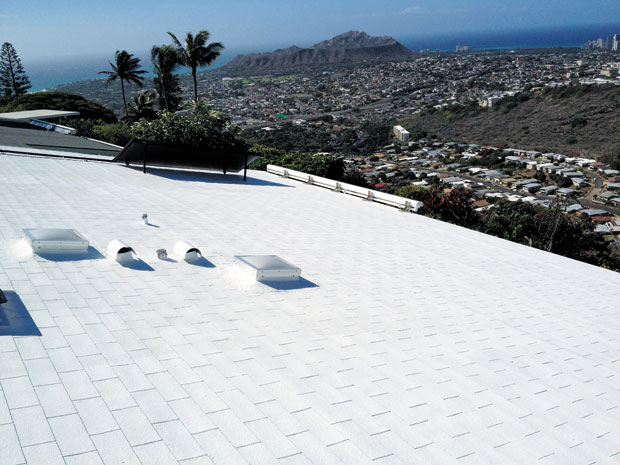Whether you want to install it yourself or have a professional do it, The Cool Roof Store can show you why a silicone-based roof coating may be the last roof you will ever need. Whether you have a flat roof or a shingle roof, silicone coatings can stand the test of time.
Look around any neighborhood in Hawaii and you will see a real change taking place — the “Cool Roof” revolution. Instead of tearing off your old asphalt roof and hauling it to the dump every 10 to 15 years, choose to save money by having your existing roof topped with a long-lasting coating that is warranted up to 50 years.
Silicone coatings have so many positive points that it’s easy to see why they are growing in popularity every day. In fact, they have become the leading roof system that the Cool Roof Store sells over the last year. Lets look at a few reasons why.
Silicone coatings will withstand heavy ponding water indefinitely. Because they are not water-based like acrylic coatings, they don’t absorb moisture. While top-end acrylics — when reinforced with Roof Fabric — can withstand moderate ponding water, silicones are in a league of their own.
These coatings will not chalk off over time. Silicone is a “non-sacrificial” coating, meaning it will not slowly shed as the years go by. How long will it last? Gaco, the oldest and largest brand, offers a 50-year material warranty against defects in the coating. If you have your silicone roof installed by an authorized contractor, you can have a manufacturers labor and material warranty for up to 20 years — the industry’s gold standard.
With silicone coatings, the entire roof will not need to be reinforced with roof fabric, saving a lot of time and money.
In some cases, homeowners may want to reinforce a few “weak-knee” areas — like the perimeter drip edge or a skylight curb — with roof fabric. However, in most cases it’s not needed. The Gaco Peel and Stick roof fabric is an easy and inexpensive way to do this. Even easier is the Gaco Liquid Roof Tape, a thick, buttery caulking, which is simply applied with a brush.
Because you need less material — as little as 2 gallons per 100 square feet if your roof is smooth — the cost is about the same as a quality acrylic roof system, which needs 4 to 5 gallons per 100 square feet.

If you have a rough, dry “cap sheet roof,” you may need to first apply a base coat of either silicone or acrylic to seal off the thirsty roof below.
Only apply the silicone when the roof is absolutely dry, including any base coats you installed. Silicone is a vapor barrier, which is great as a protection against ponding water, but may bubble if the roof below is wet. Not to worry, though, because any bubbling can be easily and inexpensively fixed by popping the bubbles and touching up with a dab of coating.
A coated silicone roof is slippery when wet.
The moment it even sprinkles you’ll want to get off the roof before it becomes a slippery slide. Leave those mangoes for another day.
Always reinforce loose roof seams — and the entire perimeter drip edge — with reinforcing roof tape. All flat roofs have a tendency to unravel over time along the edge and rot the fascia board below.
With silicone coatings, you are preparing your roof for 20 to 50 years of service before you have to coat again. With any luck, you will never have to pay to tear off your old asphalt roof again. The cycle of obsolescence will have been broken. That is the beauty of the “Cool Roof” revolution.
COOL ROOF STORE
contact // 591-1900
address // 575 Cooke St.
web // www.CoolRoofStore.net
See more articles from: Cool Roof Store